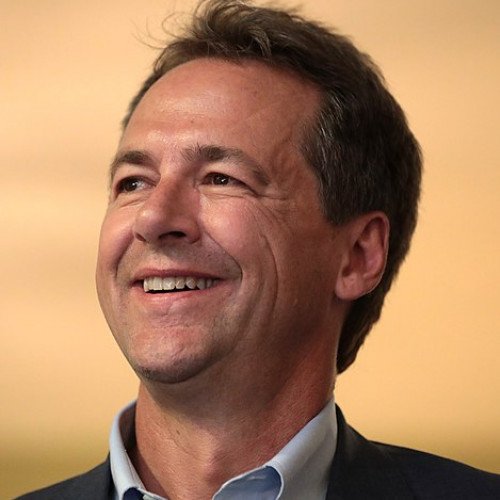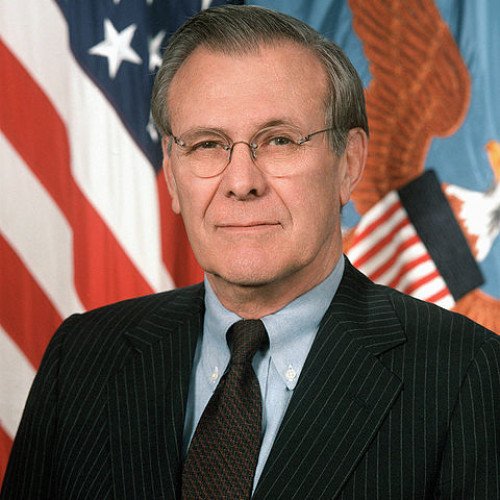Steve Bullock VS Donald Rumsfeld

Steve Bullock
Stephen Clark Bullock (born April 11, 1966) is an American politician and lawyer, who served as the 24th governor of Montana from 2013 to 2021. He is a member of the Democratic Party. Born in Missoula, Montana, Bullock graduated from Claremont McKenna College and Columbia Law School. He began his career working as legal counsel to the Secretary of State of Montana before becoming the Executive Assistant Attorney General and acting Chief Deputy Attorney General of Montana. Bullock then entered private practice as a lawyer for Steptoe & Johnson. He was an adjunct professor at George Washington University Law School before opening his own law firm upon returning to Montana. In 2008, Bullock was elected Attorney General of Montana, and he served one term from 2009 to 2013. Bullock declared his candidacy for governor of Montana on September 7, 2011. The seat was open in 2012, as incumbent governor Brian Schweitzer, a Democrat, could not seek reelection due to term limits. Bullock won the Democratic primary with 87% of the vote and defeated Republican former Congressman Rick Hill in the general election with 48.9% of the vote. In 2016, Bullock was reelected with 50.2% of the vote, defeating Republican nominee Greg Gianforte. Bullock chaired the National Governors Association from 2018 to 2019. He was a Democratic candidate for President of the United States in 2020. After suspending his presidential campaign, he announced his candidacy for the United States Senate in the 2020 election. On November 3, Bullock lost to incumbent Senator Steve Daines.
Statistics for this Xoptio

Donald Rumsfeld
Donald Henry Rumsfeld (born July 9, 1932) is a retired American politician. Rumsfeld served as Secretary of Defense from 1975 to 1977 under Gerald Ford, and again from January 2001 to December 2006 under George W. Bush. He is both the youngest and the second-oldest person to have served as Secretary of Defense. Additionally, Rumsfeld was a three-term U.S. Congressman from Illinois (1963–69), director of the Office of Economic Opportunity (1969–70), counsellor to the president (1969–73), the United States Permanent Representative to NATO (1973–74), and White House Chief of Staff (1974–75). Between his terms as Secretary of Defense, he served as the CEO and chairman of several companies. Born in Illinois, Rumsfeld attended Princeton University, graduating in 1954 with a degree in political science. After serving in the Navy for three years, he mounted a campaign for Congress in Illinois's 13th Congressional District, winning in 1962 at the age of 30. While in Congress, he was a leading co-sponsor of the Freedom of Information Act. Rumsfeld reluctantly accepted an appointment by President Richard Nixon to head the Office of Economic Opportunity in 1969; appointed counsellor by Nixon and entitled to Cabinet-level status, he would also head up the Economic Stabilization Program before being appointed ambassador to NATO. Called back to Washington in August 1974, Rumsfeld was appointed chief of staff by President Ford. Rumsfeld recruited a young one-time staffer of his, Dick Cheney, to succeed him when Ford nominated him to be Secretary of Defense in 1975. When Ford lost the 1976 election, Rumsfeld returned to private business and financial life, and was named president and CEO of the pharmaceutical corporation G. D. Searle & Company. He was later named CEO of General Instrument from 1990 to 1993 and chairman of Gilead Sciences from 1997 to 2001. Rumsfeld was appointed Secretary of Defense for a second time in January 2001 by President George W. Bush. As Secretary of Defense, Rumsfeld played a central role in the invasion of Afghanistan and invasion of Iraq. Before and during the Iraq War, he claimed that Iraq had an active weapons of mass destruction program; yet no stockpiles were ever found. A Pentagon Inspector General report found that Rumsfeld's top policy aide "developed, produced, and then disseminated alternative intelligence assessments on the Iraq and al Qaida relationship, which included some conclusions that were inconsistent with the consensus of the Intelligence Community, to senior decision-makers". Rumsfeld's tenure was controversial for its use of torture and the Abu Ghraib torture and prisoner abuse scandal. Rumsfeld gradually lost political support and he resigned in late 2006. In his retirement years, he published an autobiography Known and Unknown: A Memoir as well as Rumsfeld's Rules: Leadership Lessons in Business, Politics, War, and Life.